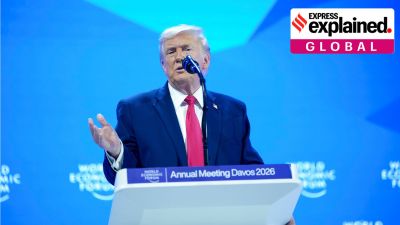Ambedkar, in bits and pieces
The recent gesture of the BJP using excerpts from B.R. Ambedkar8217;s writings for political propaganda in Uttar Pradesh is in keeping with...

The recent gesture of the BJP using excerpts from B.R. Ambedkar8217;s writings for political propaganda in Uttar Pradesh is in keeping with the political tradition of the country. Ever since independence, political parties have derived strength by capitalising on Ambedkar, even as they have studiously ignored the essence of his ideology.
The first party to do this was, in fact, the Congress, despite the fact that Ambedkar throughout his life had been one of the harshest critics of Congress policies, who did not even spare Mahatma Gandhi. Yet so successful was the Congress in coopting him that people to this day believe that Ambedkar belonged to this party.
It8217;s true, of course, that he was the Union law minister in the first Indian cabinet headed by Pandit Jawaharlal Nehru. Nehru8217;s cabinet had included two persons who were not Congressmen: Ambedkar and Shyamaprasad Mukherjee. But, interestingly, Ambedkar resigned as law minister in 1951, when the then ruling Congress party 8212; under the influence of hardline conservatists 8212; aborted his move to ensure that the Hindu Code Bill became the law. The following year, the Congress pitted its nominee, Narayan Kajrolkar, against Ambedkar for the Mumbai Lok Sabha polls and succeeded in defeating him.
But this fractious history was conveniently forgotten the moment the Congress realised the Ambedkar8217;s importance in drawing Dalit votes, both in rural areas as well as urban slums. Over the past five decades, Ambedkar8217;s iconic status remains unchallenged in some of the most socially marginalised regions of the country.
Other parties have followed the same pattern. V.P. Singh, who broke away from the Congress, went a step further to mandalise caste politics in the country. The result was that more communities became conscious of the benefits they can glean by waving the caste card. Instead of rooting out the scourge of casteism through time-bound reservations, it has been given new life by the extensions granted to caste reservations without a rigorous review of the benefits they have delivered.
The BJP8217;s rise is based on precisely such opportunism. The rule of the game is to acquire and retain power by all means. In the past few decades, there has been a rise of a number of professional leaders within that party who have been experts at forging unprecedented alliances between parties of even opposing ideologies. The coalition between the BSP and the BJP in UP, characterised by suspicion on both sides, is a prime example of such cynical politics. Even while the two parties continue to be partners in power, they also continue to work against the interests of the other.
Recent BJP propaganda on Ambedkar8217;s statements on Partition is an attempt to fragment Ambedkar8217;s thoughts to suit the party8217;s immediate objectives. At the same time, the BJP has conveniently ignored Ambedkar8217;s views on Hinduism, for instance, because it is the diametrically opposite of its own ideology. By picking only those views of Ambedkar that point out the cultural differences between Hindus and Muslims, the BJP is making its gameplan clear: to project Ambedkar as a pro-Hindu and anti-Muslim leader and thereby trying to assimilate Dalits into its fold.
In the long run, the BJP8217;s strategy is to target potential BSP voters. Sensing this danger, Mayawati raided the Congress camp and won over some supporters, at least for the moment. She knows that such allies, who lust for power, are neither permanent nor reliable but she has exhibited great manipulative skills which pass off for political acumen in today8217;s world.
What Ambedkar had really wanted 8212; as revealed in his letter to some socialist leaders in Maharashtra 8212; was a political party comprising all the have-nots, irrespective of their caste or religion, to form a powerful pressure group for the welfare of the poor.
In the existing political scenario, where fragments of his views are used out of context for narrow political gains, or 8212; as in the case of Mayawati 8212; as a ladder to power, his real agenda will be forgotten even as parties continue to exploit him in a manner that undermines his basic legacy.
If people need to understand what he stood for, he should be understood in his totality. Ambedkar was not just a Dalit leader, he was a national leader who stood for the equality and welfare of all human beings, irrespective of caste, religion or gender.
- 01
- 02
- 03
- 04
- 05































